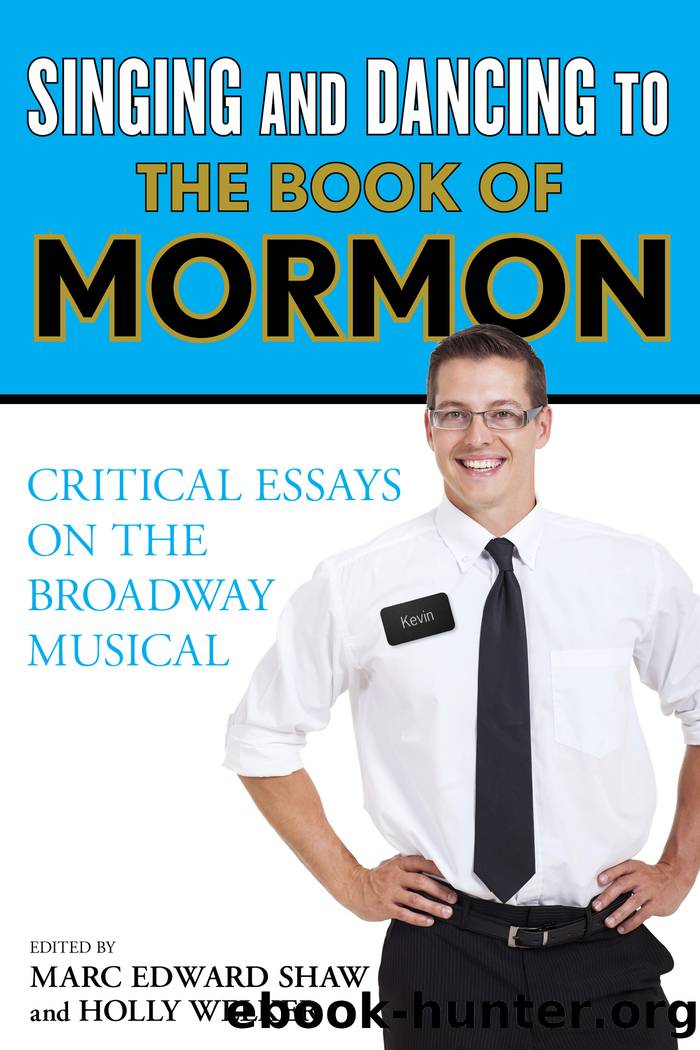Singing and Dancing to the Book of Mormon by Marc Edward Shaw

Author:Marc Edward Shaw
Language: eng
Format: epub
Tags: undefined
Publisher: Rowman & Littlefield Publishers
Published: 2012-03-15T00:00:00+00:00
The Book of Mormon begins, as we have seen, by trumpeting the power of the Book of Mormon itselfââIt has so many awesome partsâ[11]âbut it ends by celebrating the power of an entirely new scripture, âa sacred text . . . of pioneers and frogs.â[12] The transformation of the actual Book of Mormon into a sort of Gospel of Arnold Cunningham is presented not as a rejection of the original text but as, ironically, an extension and evolution of that textâevidence of the power of believing in it in the first place. As Elder Price is amazed to discover, âa bunch of made-up stuffâ can serve a higher purpose just as well as his own supposedly divinely sanctioned tradition can,[13] because in postsecular faith all scriptures are admitted to be at best artificially divine even as they do allow access to âthe most profound dreams, promises, and possibilitiesâ of mankind.[14]
Part of what makes The Book of Mormon postsecular in its treatment of scripture, however, is its awareness that popular American culture has created a wide range of more practically âsacredâ texts for itself. While particular religious denominations have their traditionally sacred books, America as a consumer society tends to elevate explicitly secular texts into positions that resemble those sanctioned by divine authority. The most obvious example of this phenomenon is Americansâ use of the Constitution, which (for instance) incoming presidents must swear an oath to âpreserve, protect, and defendâ in the same manner that religious leaders pledge to defend their faith from unbelievers. The Book of Mormon recognizes, however, that everyday Americans awash in pop culture adoration treat all kinds of random stories and characters with near-fanatical devotion.
At first, Elder Cunningham uses the distinction between being a Star Wars or Star Trek fan simply as an icebreaker to get to know his new partner Elder Price better: âI wanna know everything about you,â he gushes, and knowing a manâs science-fiction preferences evidently covers the most important part of âeverything.â[15] It later becomes clear, however, that in his role as a parody of the stereotypical American nerd, Cunninghamâs geeky interests have real spiritual consequences. Hobbits stand beside Mormon and Moroni as symbols of his conscience in the song âMaking Things Up Again,â and Boba Fett and the Ewoks show up as part of the new Gospel of Joseph Smith and the frogs that the Africans eventually adopt. Even Elder Priceâs naïve vision of Orlando as the best place to do missionary work suggests an elevation of capitalist fantasy (âSea World and Disney and / Putt-Putt golfingâ) into the most profound of spiritual opportunities.[16]
As with most elements of The Book of Mormon, there are two distinctly different ways to look at these moments in which everyday mass consumerism becomes invested with transcendent meaning. Our first instinct, perhaps urged on by the showâs penchant for encouraging laughter in the most inappropriate places, is to lampoon not only the nerdy interest in popular culture but the attitude that such idol worship shares with religion generally.
Download
This site does not store any files on its server. We only index and link to content provided by other sites. Please contact the content providers to delete copyright contents if any and email us, we'll remove relevant links or contents immediately.
Eats, Shoots & Leaves by Lynne Truss(1346)
Nickel and Dimed by Barbara Ehrenreich(1142)
Midnight's children by Salman Rushdie(1021)
The Imaginary Invalid by Molière(1018)
Bring Up the Bodies by Hilary Mantel(894)
Black Coffee (Poirot) by Agatha Christie(849)
The 500 by Matthew Quirk(817)
The Lovely Bones by Sebold Alice(812)
The Seagull by Anton Chekhov(806)
Buried Child by Sam Shepard(771)
Steven Berkoff by Steven Berkoff(750)
An Ideal Husband by Oscar Wilde(739)
The Bourgeois Gentleman (World Classics) by Molière(737)
The Comedy Bible by Judy Carter(676)
Profiles by Tynan Kenneth; Tynan Kathleen;(666)
Tobacco Road by Erskine Caldwell(662)
Finding Roger by Rick Elice(658)
The Guys by Anne Nelson(613)
Mrs. Warren's Profession by George Bernard Shaw(604)
